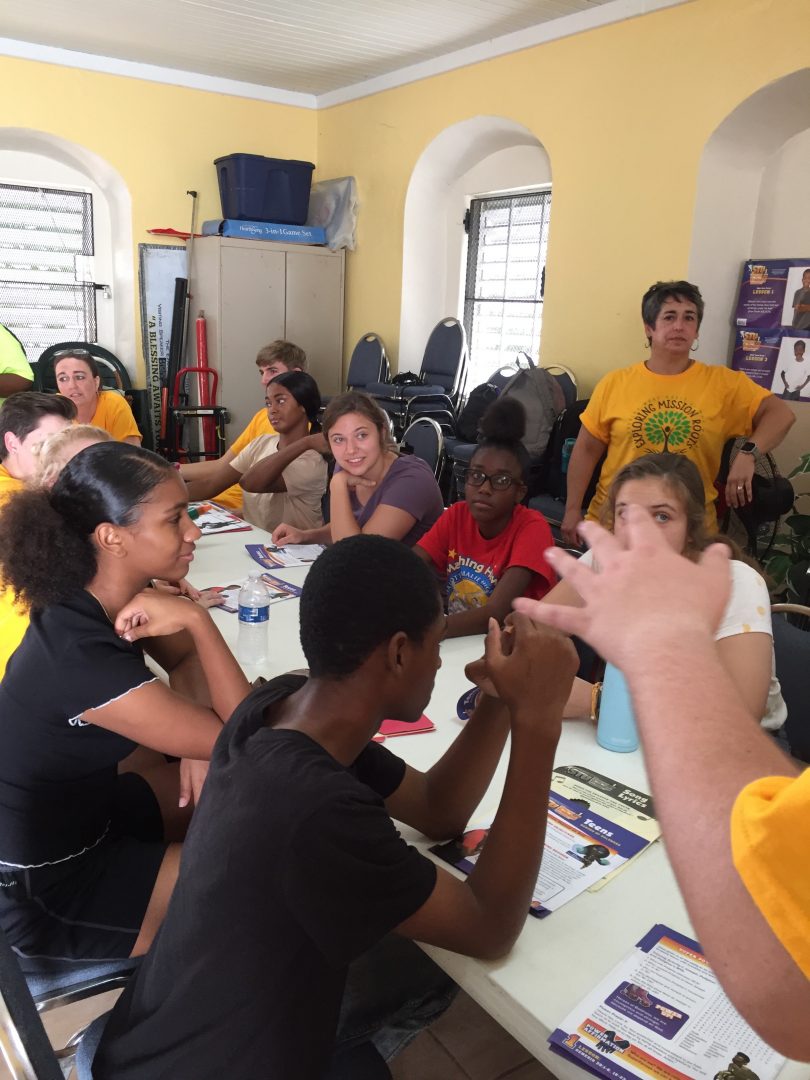(Participants of the 2019 Young Adult Convo at a Vacation Bible School at New Herrnhut Moravian Church on St. Thomas)
A Vision of God’s Kingdom
by the Rt. Rev. Chris Giesler
Assigned Texts:
- Genesis 45:3-11, 15
- 1 Corinthians 15:35-38, 42-50
- Luke 6:27-38
Among the petitions in the Lord’s Prayer is one that says, “Thy will be done on earth as it is in heaven.” This prayer should then cause us to ask, “what does God’s will on earth look like if we are hoping that it will match what the heavenly kingdom looks like?” Our Gospel text for today gives some a pretty good idea.
Here Luke gives us a view of just how different our world is from what God’s kingdom is supposed to look like. The keyword here is love. Luke uses the Greek word “agape,” which translates as “love” in English. But this isn’t “eros,” which is romantic love, or “philia,” which is neighborly love. “Agape” is unconditional love. All other forms of love are subject to conditions, especially if the love you give is either not matched or given back. God’s kingdom looks very different indeed. Agape love dares to love no matter what comes back to us. It means that no matter what others do to us, we will not allow their actions to keep us from reflecting God’s love, mercy, and grace back to them. In this passage, Jesus is calling us to this kind of radical love. Here is what is called for:
- Love your enemies
- Do good to those who hate you
- Bless those who curse you
- Pray for those who abuse you
- If anyone strikes you on the cheek, offer the other also
- If anyone takes away your coat, do not withhold even your shirt
- Give to everyone who begs from you
- If anyone takes away your goods, do not ask for them again
- Do to others as you would have them do to you.
- Do not judge, and you will not be judged
- Do not condemn, and you will not be condemned
- Forgive, and you will be forgiven
- Give, and it will be given to you
Let us start with this assumption, Jesus is not calling on us to suffer from an abuser or someone who is consistently trying to take advantage of us for their gain. That simply would be inconsistent with the totality of Jesus’ teaching. No one on earth has the right to hurt another, either physically or emotionally. We should never interpret these teachings of Jesus to mean that if we are in an abusive relationship, we should stay there. Doing so will only enable their sinful behavior to continue.
Jesus’ teachings here call us to move the world closer to God’s intent for all of us. Look back over the list again. What an amazing world this would be if we could all live by these teachings. Imagine for just a moment a world without enemies, where our every intent is to do good for others, where we bless rather than curse, where we pray for others rather than abuse them. That alone would radically transform the world.
The truth is that we can live on both sides of these kingdoms. Sometimes we do the things that bring ourselves and others closer to bringing God’s will to earth. At other times we perpetuate the evil that keeps God’s will from being done. One example of this is what our Moravian forefathers and mothers did in 1731. Zinzendorf had brought an enslaved person by the name of Anthony to Herrnhut to tell the community of the conditions under which his family members were suffering on the Caribbean island of St. Thomas. After hearing Anthony’s story, several members of the congregation felt the call of God to go and share the compassion of Christ with these enslaved people. The prevailing view among most Europeans at the time was that these enslaved Africans were not fully human and so did not have souls worthy of saving. So, the congregation drew lots, and Leonard Dober and David Nitschmann were chosen to go and preach to the slaves. Truly, this community of Christians saw beyond the prevailing views of white Europeans that these enslaved people of color were less than human and could be treated like they were animals.
At the same time, however, the Moravians, Zinzendorf included, felt slavery itself was justifiable. They even sighted scriptural texts (usually out of context) to justify their position. By these Moravians, cruel and inhuman treatment was seen as sinful; but the notion that owning another person as property was part and parcel of God’s kingdom. The Moravians themselves purchased a plantation on St. Thomas, on which they bought and sold enslaved people. This pattern was also present in the settlement congregations in Bethlehem, PA, and Salem, NC.
Turning our hearts and minds to our present context, we must see the call of Jesus to radically love others as paramount to our notions of what is right and what is wrong, who we feel is in, and who we think is out. Our calling, our mission is to love others no matter what.
Let us pray: Loving and amazing God, may your will be done on earth as it is in heaven. And may you move us to make that happen!







